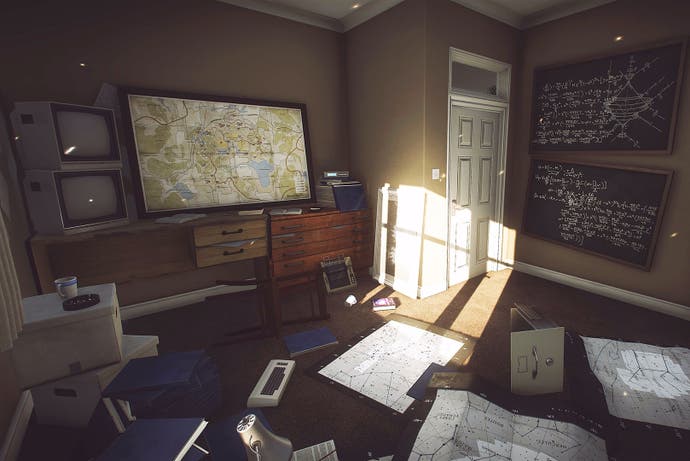The doors close on The Chinese Room - for now
"We're done with walking simulators."
Just under a year after the launch of Everybody's Gone to the Rapture, a "walking simulator" about dealing with loss in Shropshire in 1984, it won three BAFTAs. For its developer The Chinese Room, it seemed things couldn't get any better. Fans anxiously awaited the studio's next big project. They're still waiting.
Rapture could be the last major title the studio releases for quite some time. That's because in late July, The Chinese Room husband and wife directors Dan Pinchbeck and Jessica Curry laid off the entire staff - at that point what amounted to eight people - and ditched their Brighton office for home. Here, we reveal what happened, why it happened and what's next.
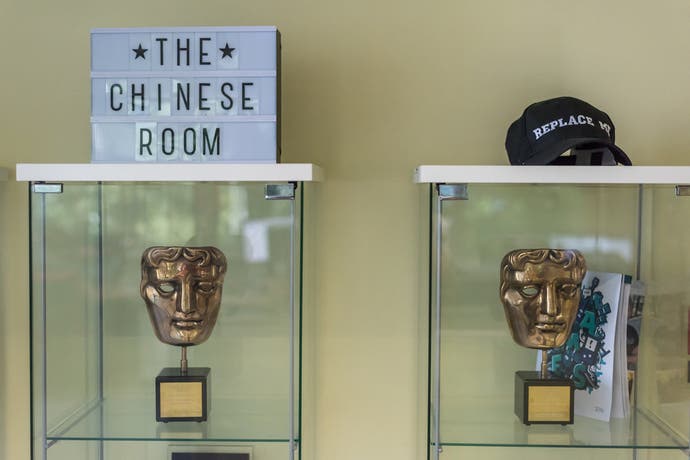
"It's really expensive running a studio," Dan Pinchbeck tells me. "We were 11 or 12 people at that point. You're chewing through £35 - 40,000 a month, which is pretty hefty. Your running costs are very high..."
As an independent video game developer, The Chinese Room lives by the seat of its pants. It is the same for so many across the video game world. If money's not coming in, you can't pay the bills. That's why developers often spend as much time pitching projects as they do building games. If there's nothing coming next, it could be hard to keep the lights on - maybe even impossible.
The Chinese Room is known for walking simulators. Its breakout hit, Dear Esther, perhaps spawned the label. Everybody's Gone to the Rapture cemented The Chinese Room's reputation for being an expert of the genre. But behind the scenes, Pinchbeck had grown bored of walking sims, and wanted to create something "more traditional and more ambitious".
To create something more traditional and more ambitious, The Chinese Room needed money - publisher money. But it's so far failed to convince a company to sign on the dotted line.
"We're done with doing walking sims and story stuff," he says. "We wanted to do something more complex, more involved and bigger scale. And that takes a long time to negotiate, which makes it difficult if you are coming to the end of a project, you're burning £35-40,000 a month, and you know you're probably looking at another five or six months worth of negotiations going ahead, where you've got no income coming in."
The Chinese Room had little breathing room. It had burnt through most of the studio's capital keeping the development team on between Everybody's Gone to the Rapture and recently-released Google Daydream project So Let Us Melt. It spent time prototyping. It was selected to received a €72,339 grant from Creative Europe for a game called Little Orpheus, but Pinchbeck says that money has yet to come through. There's another game, a survival horror meets RPG called 13th Interior (formerly Total Dark), that is in the early stages. But it doesn't sound like either will come out any time soon.
"We looked at it all and we went, we want to continue making 13th, actually we probably just need a couple of us doing that for the time being until that's really there," Pinchbeck says.
"We want to chase the pitch for Little Orpheus, which is going to take months. And, we don't have the capital to just keep a team in place, just to keep the lights on in that interim period.
"So, as hard as it is, in terms of the long-term future of the studio, let's just wind things down."
The Chinese Room went dark at the end of July, but Pinchbeck and Curry had told the staff they were being laid off beforehand. All this two months before the game they had worked on, So Let Us Melt, came out.
"That was a really tough decision," Pinchbeck admits. "We had two options. Either you tell people before the project ends and try and buy them as much time as possible to find new jobs, which makes the end of production really stressful for them, or you do the easier one for you as a business, which is you tell the people the day after you ship - oh, by the way... which is not an uncommon thing to happen.
"If people have been employed fewer than two years you have no legal obligations. You can literally just go, bang you're done, that's it, which is why a lot of development cycles are under two years in length. But we didn't want to do that.
"So we told people six weeks before the end of production. And then I got on the phone and sent an email to every studio I could think of locally and went, listen, we've got an amazing team here. Pretty much everyone lined up interviews pretty much straight away and most have been placed now, which makes me feel a lot better about it."
One of the reasons Pinchbeck was reluctant to discuss recent events at his studio before now was because he wanted to make sure staff had a chance to find new jobs first. Eurogamer understands most of the staff ended up at Studio GoBo, a Brighton-based collective that's worked on the likes of Disney Infinity and the F1 series. One person went to Dreams developer Media Molecule.
At The Chinese Room, only Dan Pinchbeck and Jessica Curry remain. Both work from home now the Preston Park office has been vacated ("with business rates and insurance and IT, you're talking £50 plus grand a year"). "It really is down to zip," Pinchbeck says, while insisting the studio has not shut down. "The studio is not closed, but we closed the development team."
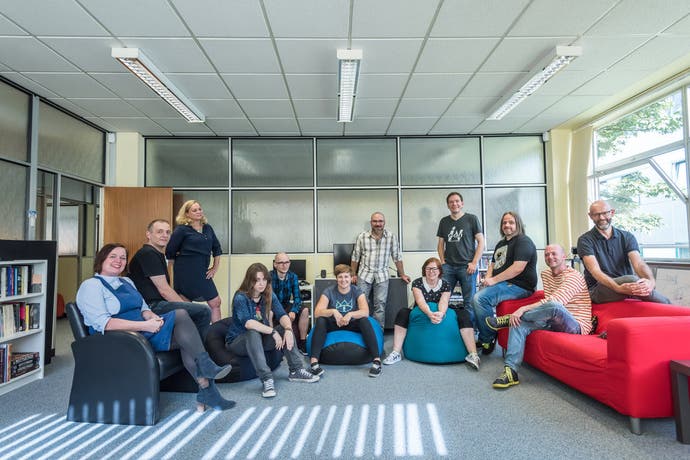
"It was horrible. You're sometimes in the position where you have to do things which are pretty horrible in the short-term to try and keep the long game going. Once you're properly down and out you're gone. That's it. It's very hard to come back from that."
It would be misleading to say The Chinese Room's current situation is all about money. There's much more to it than that. Speaking with Pinchbeck, I get the sense he's burnt out and keen to take a break. He mentions a health scare that hit amid the discussions that took place about the future of the company, which will have brought his mind into focus.
"We've been sprinting since Esther came out," he says. "We started A Machine for Pigs before Esther came out. We finished A Machine for Pigs on a Friday night and started Rapture on a Monday morning. We were straight off the back of Rapture into prototyping concepts for some work we were doing with Sony. And we were doing the PC port of Rapture the moment we finished the PS4 version. We had these side projects where we were trying to sign something up, which eventually went through to Google. We were chasing publishers through that period as well. We just haven't stopped since 2012, Jess and I."
Pinchbeck found himself wondering why he had got into the business of video game development in the first place. He questioned why The Chinese Room existed and went back and forth on the kind of games he wanted to make.
The elephant in the room is the fact the studio has failed to sign a deal with a publisher to fund development on a game, and the reasons for that are complex. To understand them, we have to look back to the development of Everybody's Gone to the Rapture, which was fraught and full of challenge.
Everybody's Gone to the Rapture was published by Sony, but it was produced by Sony Santa Monica, which at the time was trying to build a reputation for delivering high-quality, cool art house games. It had produced Journey and was working on Hohokum and Unfinished Swan at the time Everybody's Gone to the Rapture was signed. For The Chinese Room, it was an exciting development, and a perfect fit.
But working with Sony Santa Monica brought with it challenges.
"It was weird to be making possibly the most English game ever made in LA," Pinchbeck says.
The Chinese Room found itself having to explain some of the quirks of the English countryside to baffled West Coast producers. Sony's quality assurance team had complained that the game world felt too "closed down", not realising what stiles were for, for example.
"We realised they don't have stiles in America," Pinchbeck says. "We had to explain, you see that thing that looks like two crossed pieces of wood, that's a step. You can climb over a hedge with that. Oh right, okay! Suddenly they were everywhere in the world.
"There were things for which there was no frame of reference in the States at all. No-one knows what a kissing gate is..."
Here's another example of the manifestation of the US / UK cultural divide. One of the bigger discussions revolved around English country roads acting like corridors because of the 10 foot hedge banks you get on either side. One of Sony Santa Monica's design consultants struggled with the concept, Pinchbeck says.
"It's just a corridor without a roof. So you've got to mix up the open world stuff but you can't have sightlines off all these roads, because it just won't feel like England. It's really enclosed. Those kind of things you take for granted. But then you think, the landscape is so different and so integral to what the experience feels like."
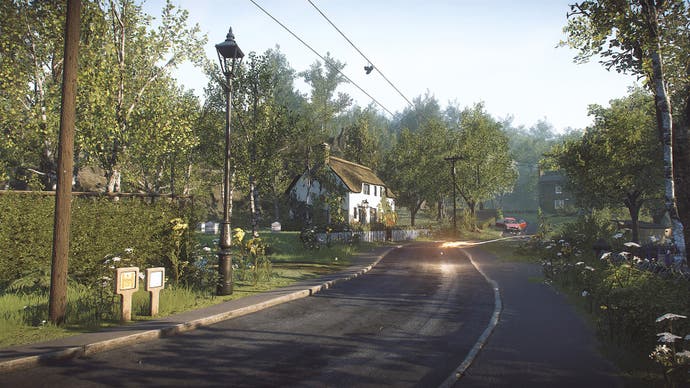
Pinchbeck says good came from this at times frustrating process, because it challenged The Chinese Room's assumptions. But he admits the studio's obsession with detail at times caused issues.
"Jess particularly, she's got such incredible attention to detail," he says. "She was coming in and going, those flowers cannot grow in that environment at this time of year. And the art team were going, we need yellow. And she was like, you can't have a yellow flower, not in Shropshire, not in June. That's it.
"There were daffodils and she was just like, get rid of the daffodils! The daffodils are four months late!"
Another example: the developers spent days trying to work out when plastic wrapping on hay bales became a thing in England, because it was a "nightmare" getting hay to look right in the game. It turned out, plastic wrapping had happened in Scandinavia at the time the game was set, but had yet to come across to the UK. "We were three years too early," Pinchbeck says. "It would have made life a lot easier."
Three out of the five-person art team who worked on Everybody's Gone to the Rapture were fresh out of college, Pinchbeck says. They weren't born when the game was set. One day, they put wheelie bins in the world. They were 10 years early, and had to be removed.
This obsession with authenticity caused an "intense" development, Pinchbeck admits. For the project leads, everything had to be right. If you knew the 80s, you'd spot errors in Everybody's Gone to the Rapture a mile off - and the developers knew it.
"I can't remember who did it, coming in one day and seeing someone had put a frisbee on the roof of a garage," Pinchbeck remembers, "And I just went, that's it. That's the level we have to be thinking at here. Little things."
The Chinese Room tore down and rebuilt the village in Rapture five times over the course of development. They only locked it 10 months out from finishing the game. The developers were, as you'd imagine, exasperated.
"When you say things like that and say listen folks, this is going to hurt, I know you spent months on this, but it's just not up to scratch. We're just going to have to do it again..." Pinchbeck says, "you need that goodwill."

Fans of Rapture might have noticed a big blank area in the game that's weirdly horseshoe shaped. This is a huge patch of unfilled in land called Black Dog Run, so named after Winston Churchill's depression. The developers would call it the DLC zone because it was so big. The thing is, it was originally intended to be populated, but halfway through development The Chinese Room decided it didn't have enough time to populate it. So it shipped blank.
At times Sony producers had to remind The Chinese Room of their legal obligations. One of the game's artists created a watercolour of Margaret Thatcher to hang on a wall, but The Chinese Room wasn't allowed to use it because it wasn't sure if it could get permission from the Margaret Thatcher Foundation. The watercolour spent six months of development stuffed in a bin around the back of one of the in-game houses, then it was pulled. "It might be hanging on the wall of a closed house somewhere in there..." Pinchbeck says.
All the while, it looked like The Chinese Room wasn't making a huge amount of progress, which raised the odd eyebrow at Sony Santa Monica. Pinchbeck puts this down to the nature of walking sim development.
"The biggest problem with a walking sim is you don't have mechanical systems you know are right," he says.
"90 per cent of the game working or not working is atmosphere and immersion, and you need all the assets for that to happen. You're running on faith a lot of the time. You've got to trust yourself and the team that what you are doing will pull together and will be right once it's reached that level of polish. But it's not reaching that level of polish for potentially 18 months to two years. That's really challenging.
"You're constantly going, just trust me on this. It will be right. I can see it. I can feel it. This will fall together. But you've got nothing to base that on apart from your instincts as a developer. And that's tough. That's tough on everyone. That's really hard on publishers as well. You're working with your producers, but those producers are working with marketing teams and accountancy teams. With Rapture, the game didn't look very different a year into development than it did at the beginning of development. And that was a year of progress.
"There was a tiny six foot wide visual showcase area we showed at the first E3, but the only person who could drive it was me, because if you looked off that path it was just grey box as far as the eye could see. It was like scorched earth. And it stayed like that for a really long time."
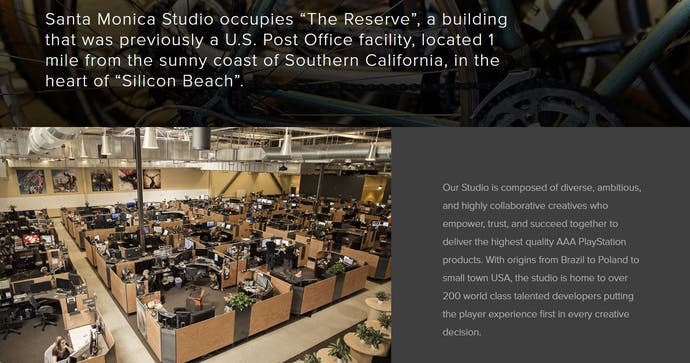
Then there was the logistical challenge of working with a publisher half the world away and eight hours behind. When it's 9am in Los Angeles, it's 5pm in Brighton. "That means someone's got to be online at night talking to them, which is hard," Pinchbeck says.
"I was flying out to LA every month. I would fly out in the English afternoon, arrive there US afternoon, go straight to Santa Monica, have a meeting, go out for a meal, get up the next day, meetings and stuff all during the day, back to the airport and fly back. That 48-hour turnaround for probably the best part of a year at the end of development, which was pretty brutal."
The Chinese Room prides itself on ethical development. Pinchbeck calls it a "nine to five studio", but even then, the dreaded crunch could not be avoided towards the end of Everybody's Gone to the Rapture's development.
"It wasn't everybody at all," Pinchbeck says. "The leads crunched. The art director. Lead programmer. Lead designer. Me and Jess. Most of the team didn't, actually. They did a couple of like, oh we worked till seven. We were like, that's not crunch. But even then, not much. No weekends. A lot of the pressure accumulates at the top."
But why? Why did The Chinese Room succumb to crunch, like so many developers do?
"You have a title that's working perfectly," Pinchbeck explains. "Milestone day, you roll up in the morning, quite happily turn the computer on and it's completely broken. Overnight it all breaks. Those last little incremental bits of polish can radiate down and cause loads of problems. There's always that."
Pinchbeck says The Chinese Room's size worked against it at times. Only a dozen people worked at the studio while the game was being made. One issue that would barely register on the production schedule of a 50-person project was devastating for The Chinese Room.
"One of our artists got another job and left before the end of production and we went from three artists to two artists a couple of months out," Pinchbeck says. "It was pretty catastrophic, running around trying to make that capacity back up again. Absolutely it was his prerogative. It was a great opportunity and I'm really happy he took it, but you've got to deal with that."
On 9th October 2015, just a couple of months after Everybody's Gone to the Rapture came out, Jessica Curry announced she was leaving The Chinese Room - sort of.
"I pushed myself to the edge of a precipice on Everybody's Gone to the Rapture," she wrote in a blog post. Curry would remain a company director at The Chinese Room, and indeed would continue to work on the music for its games, such as So Let Us Melt, but she planned to step away from the nitty gritty of development.
Curry also spoke about what she felt was "the desperately toxic relationship" she was in with her publisher. She didn't name Sony, but it was clear that was who she was referring to.
"Working with a publisher made me extremely unhappy and very ill," she wrote.
"In the end I didn't even recognise myself anymore - I had turned from a joyful, fun-loving, creative, silly, funny person into a short-tempered, paranoid, unhappy, negative heap.
"So much of the stress that I experienced was caused by what I see as the desperately toxic relationship that I was in. I can't go into detail here for the reasons above but what I can say is that I look back at the way we were treated and it still makes me shake my head with disbelief.
"Big business and the creation of art have always been extremely uncomfortable bedfellows and making Rapture proved to be no exception for me.
"I don't want to do this anymore - in fact I can't do it. I want to surround myself with honest, open people whom I can trust. I've heard so many people say, 'well, this is just the way publishers are' and 'this is just what the games industry is like'.
"What I would say to that is while we all keep accepting this, while we are so afraid to challenge this behaviour then it won't change and we all deserve nothing but the meager crumbs we are thrown."
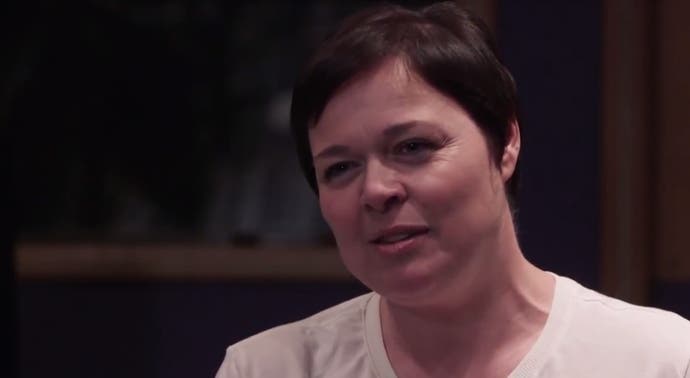
The blog post cast Sony in a bad light. But what went on? Pinchbeck says The Chinese Room got caught in the middle of the politics that arise from Sony's company structure. Sony's PlayStation business in the US operates independent from its business in Europe. They are, for all intent and purpose, two separate companies, with differing terms and conditions and certification processes. Developers must deal with both separately if they want to release their game in North America and Europe.
"The root of a lot of it, it was very difficult being an English company working with Sony America but also trying to distribute in Sony Europe," Pinchbeck says.
"They're two completely different companies. There were some issues to do with ownership. Who owns this project? Who's responsible for this project? Who's championing this project? Being the developer in the middle of that was hard. We shouldered a lot of that burden.
"Relationships drift and agendas change. And things happened that you don't have access to. Particularly big companies. You don't know what's going on behind the scenes. And you can be on the receiving end of stuff that at the start of the chain of logic, is the logical thing to do. By the time it hits you, there is no logic there any more and it's just you going, shit, what happened with that?
"We've made efforts and Sony have made efforts to go, look, something went wrong there and let's try and get past it. It probably should stay as something that went wrong and we've tried to go past. It went south. And it does. We're not the first company that's happened to and we probably won't be the last.
"It's difficult when you have lots of layers of remove. As a developer, you're passionate. Your game is your thing. It's absolutely everything. And for a publisher, your game is a piece in a portfolio. They're very very very different things. It means the way decisions are made doesn't always tally and it can feel wrong from either side. Some stuff went wrong.
"A lot of the people making those decisions that radiate down to development know nothing about games. They're not there to do games. They're there to push numbers around the portfolio, to fit a corporate agenda and to make the corporation successful. Even if you're making a big game - you're still a tiny part of the overall thing.
"You have to try and jolt yourself back into that understanding, particularly when you're so obsessively focused on what you're doing and going, why don't they care? Well, they kind of wouldn't, because this is this and there's that over there and that's just fucking massive."

There are two sides to every story, of course, and Pinchbeck admits The Chinese Room's way of working has caused problems with publishers in the past. He recalls walking out of early discussions with a publisher, around a year after Rapture, after "a couple of flags tripped".
"We sat them down and we went, okay listen," he says. "There are these things we see as being, this is how we like to work and how we do things. There is some stuff we won't do. And it's just there and this will be a problem. And if you work like that, that's okay. But there will be a conflict with the way we work.
"So, if we tell you these things about ourselves, about how we like to do things, if you look at that and you go, okay, we think that's too much work, we don't want to work with you, we'll shake hands and we'll walk away from this now, that's fine.
"And we shook hands and we walked away from it. And it was fine.
"I'm 44. There's a finite amount of time you have. I don't want to look back on my career in the games industry and go, I wish I hadn't made those games like that.
"There are these games we want to make. And there's a way in which we want to make those games. And if there's a fundamental incompatibility between that and being able to operate in this industry, we'll walk away. What we won't do is end up making games we don't want to make in a way we don't want to make them. We're still human beings and you've got to be happy at the end of the day. I want to see my child. I want to spend time with the woman I love. If the choice for me is being locked in an office till 10 or 11 at night and every weekend, not getting home, not seeing my kid, not being with Jess, but hey I get to make games - screw that! I'll quit. I'll go and do something else."
A lot of this publisher difficulty revolves around creative control. "We are uncompromising on creative control," Pinchbeck declares.
"We work on the basis of going, you've seen what we can do. You've talked to us. We're quite upfront about who we are, about our politics, about our approach to ethics in business. We've caused waves. We've started fights. We've been absolutely dragged through the shit by some parts of gaming culture for things we've said about things like diversity and politics. We're not going to not be vocal, ethical, leftwing practitioners. That's it. That's what you get.
"I'm not the type of person who's going to go, yes, everyone's welcome to buy our games. I'm like, I don't want those people buying our games because I don't like what those people stand for. I had more death threats than... horrendous abuse. And really serious stuff that's gone beyond the, we're getting trolled online through to shit, this is properly serious threats.
"It's hard to be the person sticking your neck out. We found it quite frustrating going, there are a lot of people who pay that lip service on Twitter, but when the shit actually starts coming down on one person they evaporate and don't stick up for them. That's tough.
"We are opinionated about that sort of stuff. I think that's important. I think you do have to be opinionated about it. But that can be problematic for some companies because they don't like that kind of thing. I'm not a diva who goes, it's my way or the highway. But I'm also not going to do something just because someone says it ought to be done. Everything has to be interrogated.
"I'm not very good at taking edicts from on high without going, yeah, but why?"
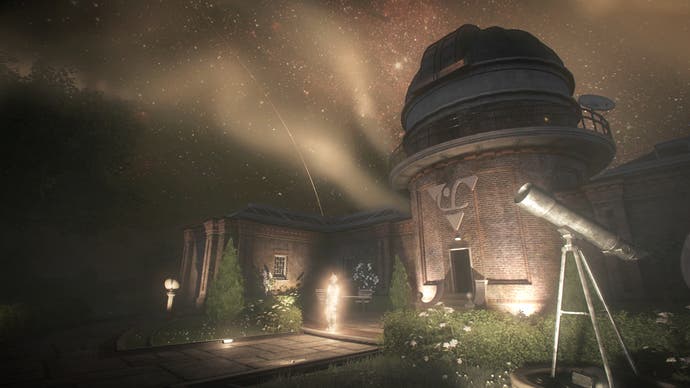
There was one occasion, however, when The Chinese Room did compromise with a publisher - and Pinchbeck regrets it to this day.
Immediately after Everybody's Gone to the Rapture came out, Pinchbeck penned a blog post in which he revealed you can sprint in the game. You hold down R2 and it builds to sprint speed over a couple of seconds. That sounds innocuous, but the game failed to mention this sprint button at all.
A couple of weeks before Everybody's Gone to the Rapture "went to final", or was due to go gold to use the industry phrase, Sony Santa Monica did a last round of playtesting. At this point, the game would automatically sprint if you help the direction for long enough. So, if you kept moving, you'd gradually ramp up to a run speed. This was included because Everybody's Gone to the Rapture could potentially involve extensive backtracking, and to walk through it would be a bit of a slog.
Playtesters, though, wanted a button devoted to sprinting so they had a choice. Pinchbeck's post said "together with Santa Monica, we made a late call" to replace the autosprint with an R2 trigger hold, keeping the gentle ramp up to main speed. The problem was, this change came so late in development, there wasn't enough time to add the sprint button to the controller icon in the options menu. The upshot was no-one knew you could sprint in Everybody's Gone to the Rapture, and the game was criticised accordingly.
"We were really sceptical because it was so late," Pinchbeck says now, over two years later. "It was very very strongly put we ought to. In the end I caved and it was a stupid decision. I went, okay, put a sprint function in. Out of everything, when Rapture hit, we were absolutely nailed for that sprint function. I didn't stick up for the game enough. As a creative director, I didn't do it. I didn't trust my instincts of going, we don't care what the playtesters think. You've got to listen to playtesters. You absolutely, 100 per cent have to listen to playtesters,. But they might not always be right. Sometimes you have to also go, but I feel this!"
Without a publisher, The Chinese Room cannot fund continued development of its games, which is one of the reasons it's gone dark. You'd think, though, given the success of Everybody's Gone to the Rapture and Dear Esther that publishers would be keen to get in on another The Chinese Room walking sim. The thing is, The Chinese Room doesn't want to work on another walking sim. In fact, it's already turned down offers to make more.
"My tastes as a gamer are not there," Pinchbeck says.
One of the issues Pinchbeck has run up against is a sort of developer typecasting. The Chinese Room has shipped four games to far: Dear Esther, A Machine for Pigs, Everybody's Gone to the Rapture and So Let Us Melt. It's known for a certain type of a game, the walking sim, the narrative game, the slow-moving emotional adventure. It is not known for action, RPG elements or, well, pretty much anything else.
"The smartest thing for us to do would to have made variations on Esther for the next 20 years because we'd have sold them," he says.
"You don't want to get pigeon-holed. We have had discussions with people where we've gone, we want to do this and add these things into it, and people have said, you can't because you've never done gameplay. I don't know how true that is.
"In a way Rapture was quite a tricky game. It's so complicated, but it looks so simple. If Rapture wasn't open world it would be pretty straightforward, it would just be like Dear Esther, walk along, fire the triggers. But there's a stupidly complicated amount of stuff going on under the hood. But we made it really well, so that complexity's not evident.
"So, when we were talking to a company about 13th and they're like, yeah but you know, an RPG has got a lot of complex systems in it, we were like, yeah, if you want to look at the AI architecture for Rapture then really you'll understand why RPG complex systems don't faze us at all. They're just not on the surface.
"But it's really important you don't end up being that company that makes this type of game because, personally, I'd get bored."

So what's next? Pinchbeck hasn't given up hope on Little Orpheus. He also intends to work on 13th Interior as and when he can. But he seems in no rush to hire staff, to build The Chinese Room back up again. He says not to expect another game from the studio in 2017. He hopes to start developing something properly again in the new year. But there are no promises here. In truth, The Chinese Room may take years to get back on its feet.
It also sounds like eventually, Pinchbeck would like to turn his attention to first-person shooters.
"I've got a PhD in first-person shooters. That's where my heart lies. I don't know if I want to necessarily make a shooter, but at the same time, it would be fun.
"If we made a first-person shooter, it would be a Chinese Room first-person shooter, and that could be kinda fun."
For Sony?
"We have a good relationship with Sony. We speak to Santa Monica still. It's business. There is water under the bridge."
Whatever's next from The Chinese Room, you can bet it'll be exactly the kind of game the developer wants to make, made in the way it wants to make it.
"We have people who love our games," Pinchbeck concludes. "We have people who absolutely hate our games. But I'm not going to chase after the people who hate our games, making compromises to our games, just to make them hate them slightly less, because we'll probably make the people who love our games love them slightly less as well."
